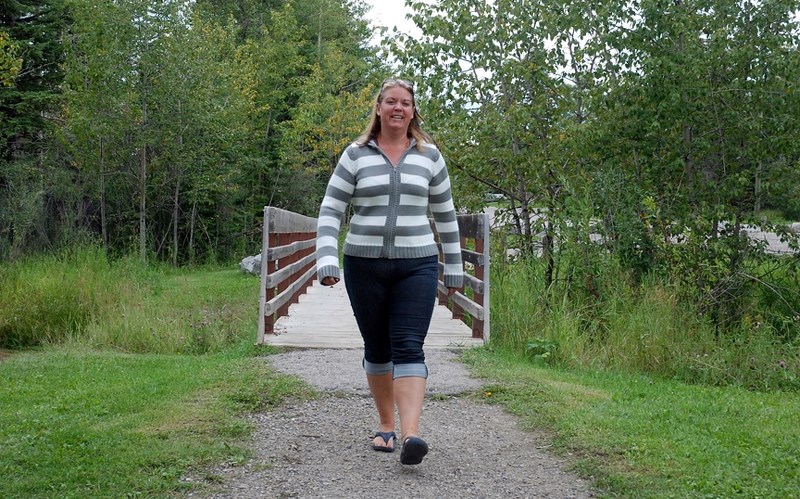A Sundre resident plans to again push herself through the arduous 100-kilometre Kidney March in September.
“It's the seventh year myself and my family has been involved,” said Charlene Preston, who was born and raised in Hanna but now lives in Sundre, where she works as the office assistant at the Rimbey-Rocky Mountain House-Sundre riding's constituency office.
The annual event takes place Sept. 9-11, starting at the racetrack at Millarville. The 100-kilometre march is broken down over three days.
“Our first day is 35 kilometres, our second day is 38 kilometres, and then our third day is 27 kilometres. We finish at the top of Canada Olympic Park,” where the closing ceremonies are held, she said.
“Everyone walks down together, including staff and volunteers. It's kind of cool because it's very surreal knowing that you're walking down the same Olympic hill that the athletes did in 1988.”
Since the Kidney March first started in 2010, only 16 people have continuously remained involved over the years, she said.
“People come and go, but there is that core group. My dad (Richard Preston) and I are two of the walkers who (will) have walked all seven years.”
Her mom Charlotte Preston has also been involved since the beginning as a volunteer crew member.
“They're the ones cheering us on at rest stops,” Charlene said about the volunteers, adding the medical team is invaluable and provides help with blisters, which are a fairly common arch-nemesis for long-distance walkers.
When asked what has compelled or motivated her to continue participating in the annual march, she told the Round Up it is largely about supporting the initiative but also continuing what has become a family tradition.
“I don't do this because I like it. No one likes to go out and create pain — 100 kilometres is a bit crazy. But we're all doing it for a cause — we all believe in the cause.”
Reflecting on what originally inspired her to get involved in the first Kidney March in 2010, she said there were a number of factors that led to her decision.
“I owned a flower shop at the time and was just in an unhealthy situation. Business wasn't good and I had gained a lot of weight. Everything was going crazy.”
So when she heard about plans for the inaugural Kidney March on the radio, Charlene found herself wanting to try it out. Her sister, Joleen Scott, also decided to get involved and they both registered for the event in the winter of 2009.
Their grandfather, Melvin Metzger, has kidney disease and was in hospital at the time the sisters announced their intention to walk the Kidney March, she said.
“He (initially) didn't approve and said, ‘You girls can't fix me.'”
But they simply explained that their decision was not just about him, but rather about the fact that one in 10 people suffer from issues with their kidneys and that there is no cure for kidney disease.
“It was about personal growth, awareness for the cause, and not ending up with kidney problems,” she said.
After being told that, Metzger was convinced and even decided to contribute the first $100 for the sisters' fundraising campaign, she said.
That same year, their father Richard turned 65 and had separately on his own time heard about the Kidney March on the radio and announced he would also take part. When their mom Charlotte asked him whether he had discussed his decision with Charlene and Joleen, Richard said “no” and wondered why. Incidentally, they all ended up on the same team, which they decided to call Team M&M in honour of the sisters' grandfather, who is still with us after 11 years on dialysis, she said.
“We all had our own reasons for walking. But ultimately it came down to our connection with kidney disease. This was a cause we decided to get behind.”
Over the past six years, the team has raised — not including this year's fundraising effort — almost $85,000. Each marcher is responsible for raising at least $2,200 while each crew member has to raise at least $300, she said.
To support their efforts, visit kidneymarch.ca, click “Sponsor a Marcher” and follow the prompts.
The Kidney March is an event created by The Kidney Foundation of Canada. The organization is made up of volunteers, staff members, donors, as well as individuals who live with the disease, from all walks of life, the event's website says.
Since its creation in 1964, The Kidney Foundation has helped millions of Canadians suffering from kidney failure and related disorders such as hypertension, diabetes, urinary tract infections and kidney stones. The organization's fundraising campaigns contribute millions of dollars to research, organ donation as well as transplant programs, and services for those with chronic kidney disease, it says.
To prepare for the march, Charlene said, “It's a case of doing a lot of walking.”
Walking five to 10 kilometres a day during the week is “not unheard of” for her. On weekends, she'll even take it up a notch to as many as 15 to 25 kilometres. Although she prefers walking outdoors at places like Snake Hill, Charlene said she has not been a stranger to the treadmill with all the recent rain.
“On Day 2 (of the Kidney March) when you need to walk 38 kilometres, it's a tough day no matter how much training you've done. This is a commitment and you go out and walk for an eight-hour day.”
By the time she and her father complete their seventh Kidney March next month, they will have walked a cumulative distance equal to that of Hanna to Fort McMurray, she said.
Her hope is to increase awareness about the disease, which seems to be a growing problem for society, as well as to raise money to fund not only research to combat the disease but also to support preventive care programs like screenings.



